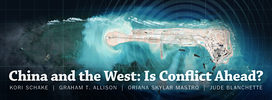Lead Essay
Kori Schake is skeptical about the idea that rising prosperity inclines modern polities toward democracy and peaceful international relations. China, though, will be the essential test of the theory in our time. Many things could still stop China’s rise, but if they don’t, then she argues we must prepare for a new policy of containment - or, if that fails, we must eventually learn to live under China’s rules.
Response Essays
Graham Allison expresses broad agreement with Kori Schake and admiration for her work. He notes three areas of potential discussion, however: First, he notes that strategic realities particular to the nineteenth century shaped the transfer of hegemony from the UK to the United States; second, he suggests we need to be clearer on what is meant by “contesting” China’s rise; and third, he argues that each country’s domestic challenges are likely to be more important than we may know.
Oriana Skylar Mastro is pessimistic about the rise of China to great power status and the effects it will have on the achievement of U.S. strategic objectives. China faces few significant obstacles to its continued rise, and the Communist Party has been largely successful in securing domestic loyalty. It has made a successful end run around the U.S.-sponsored world order largely through economic and soft power methods. The United States has been slow to rise to this challenge.
Jude Blanchette urges us to remember contingency and chance: Nothing that America did necessarily “lost” China; many factors beyond American control, and beyond most Americans’ knowledge, were also at work in China’s recent return toward greater authoritarianism. This may seem a counsel of despair, but it isn’t necessarily the case. The lack of inevitability in China’s recent political life means that further changes in direction may be on the horizon. Pendulum swings have been the norm in China’s modern history, not the exception.
The Conversation
Coming Up
Conversation to continue through the month.
Related at Cato
Commentary: “An Aluminum Lining in a Darkening U.S.-China Trade Cloud,” Daniel J. Ikenson, December 12, 2017
Policy Analysis: “Responsible Stakeholders: Why the United States Should Welcome China’s Economic Leadership,” by Colin Grabow, October 3, 2017
Policy Analysis: “A Balanced Threat Assessment of China’s South China Sea Policy,” by Benjamin Herscovitch, August 28, 2017

